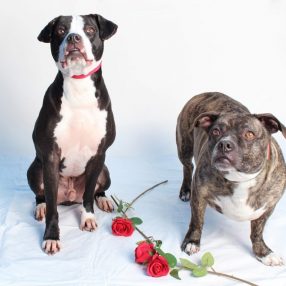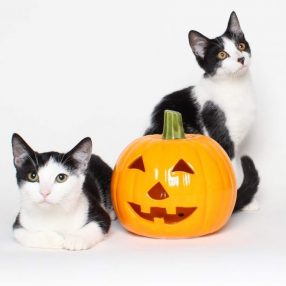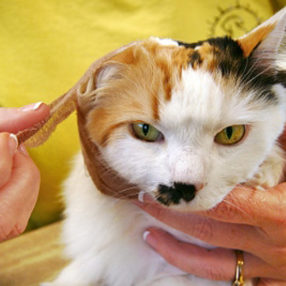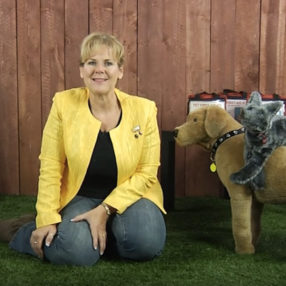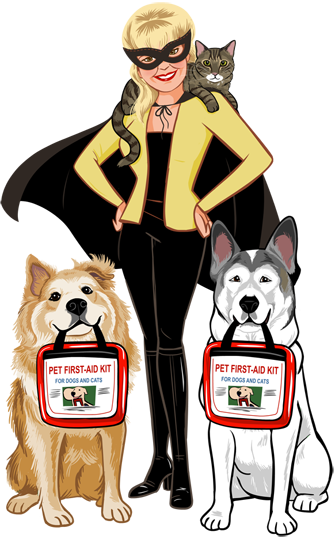It was a picture-perfect Thanksgiving…a patchwork of red, orange and gold leaves blanketed the ground while a smattering of green still clung to the branches above. The house was filled with idle chatter while all anxiously awaited the Holiday Meal. Suddenly a 90 lbs. Rottweiler, entered the room with an unsteady gait. Unable to breathe and making a ghastly assortment of noises, the dog was in grave distress while the humans nearby froze in a panic. Fortunately one human acted quickly, hugging the large dog around his abdomen and gave a quick thrust. Nothing happened, so she tried again, and this time a chunk of dog food literally flew out of the Rottie’s mouth and across the floor.
If your pet is destructive with toys, gobbles his food or consumes everything in sight, you must maintain supervision and pet-proof your home. Anything in paws or claws reach is fair game, so get down on all fours and look at your house and yard from your pet’s point of view. If you have kitties, that also includes keeping counter tops and shelves free of dangerous items!
Accidents can occur any time of year, but excitement brought on by holiday festivities makes disaster more likely to happen. Guests eager to befriend the family pet may offer inappropriate treats or not knowing better, leave doors and gates unlatched allowing for escape. Keeping the scene safe is the utmost priority, but life happens, so the best thing you can do for any animal in your care is be prepared, stay calm and make quick decisions.
CHOKING
When a dog or cat is choking, initially give him a moment to cough which is nature’s way of expelling the object from his throat. You can assist the pet’s attempts by picking up the legs of a large dog (ie: wheelbarrow position) or carefully and securely holding a small pet upside down momentarily. If that doesn’t work and the animal will safely let you, take a look inside his mouth to see if your fingers can dislodge the object. If the pet won’t cooperate or your attempt is not successful, try one of the techniques below. Never slap an animal on the back as you could cause spinal or disc damage and may forever create a trust issue with the animal by striking him with your hand.
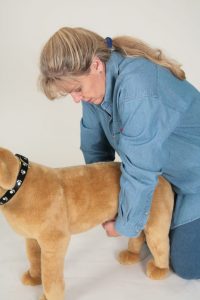
Doggie or Kitty Heimlich-like Maneuver
Although Dr. Henry Heimlich probably never envisioned his technique being used on pets, with a slight modification it can be a life-saver!
- Stand behind a medium to large dog and place your arms around his waist keeping his head lower than his stomach.
- Make a fist with your right hand and cover it with your left (lefties feel free to do this in reverse) placing your hands just behind the last rib in the soft part of the belly.
- Pull upwards five times to compress the abdomen in a quick, rapid manner. Repeat if necessary.
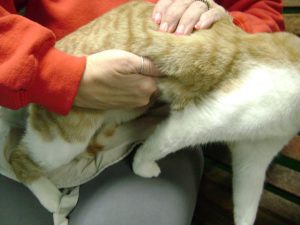 For smaller animals (any pet in which your fist encroaches upon the abdominal area), use the flat pads of two fingers while you brace the pet’s back with your other hand, and push up in the same fashion.
For smaller animals (any pet in which your fist encroaches upon the abdominal area), use the flat pads of two fingers while you brace the pet’s back with your other hand, and push up in the same fashion.
If this does not work after several attempts, there is an alternate technique…
Chest Thrusts
- Place the heel of your hands on each side of your pet’s chest and squeeze inward, pushing air out of the lungs.
- After five thrusts, give the animal a moment to cough and/or look in his mouth to see if the object is now reachable. If not, repeat.
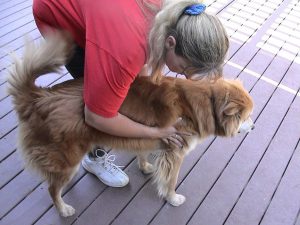
For smaller pets, use the flat pads of two fingers on each side to prevent squeezing on the entire rib cage by using the whole hand.
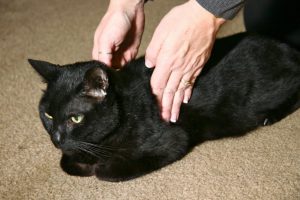
Techniques like these are best learned in a Pet First-Aid Class where you can gain confidence before performing on an animal in need.
Giving your pets a small nibble of white-meat turkey is okay, just be sure it’s boneless and fully cooked. Bones can splinter and dark meat as well as greasy skin, gristle and gravies can cause severe stomach upsets and pancreatitis in your four-legged friends.
Sweet potato, cooked carrots and green beans—inside a Kong toy — will keep canines delighted and too busy to come begging for table scraps.
Although sage makes stuffing taste yummy, it contains essential oils and resins that can cause pets to suffer stomach upset and possible depression of the central nervous system, so be sure to keep this herb out of reach.
If you’re letting yeast dough rise on the counter, make sure Fido or Fluffy don’t come near. Raw dough in a canine or feline tummy continues to ferment and can result in alcohol poisoning in your pet!
Pure pumpkin puree can be awesome for either species, especially baked in dog or cat-friendly treats. Take care however, with pumpkin, apple, mincemeat and other pies that not only have tons of sugar, but may also have raisins! And please…do keep it light with the whipped cream!
Family gatherings bring relatives and friends who may not be as pet savvy as you! Politely give guests a few rules about closing doors and gates behind them so that your precious pets do not escape; provide a safe place for toothpicks that may be used with hors d’oeuvres as once dropped on the floor with the aroma of meats and cheeses, these sharp objects become desirable to our pets and can cause puncture and choking injuries.
Be sure to safely tuck away bones, foils and plastic wraps from your pets. The food remnants on these items will make them hard to resist and could cause obstructions, choking incidents and even suffocation to your pet.
Count your blessings during this season of thanks and be ever so grateful that a four-legged friend has chosen to share his life with you!!!!!
Note: The articles on this page are copyrighted. Please do not reprint or use portions for any purpose without written permission from the author. Request permission for usage by sending an email explaining how you’d like to use the materials and what parts specifically. Thank you in advance!






